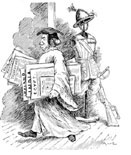
Supreme Court Voids Child Support Statutes, Supports ‘Deadbeat Dads’
YOU READ IT HERE FIRST!
Washington, D.C., June 24, 1996 — Today, in a sweeping 6-3 ruling, the Supreme Court invalidated child support provisions in recent federal legislation as an unconstitutional infringement on the right of noncustodial parents to choose whether or not to support their minor children. At the same time, the Court overturned related child support provisions that had been enacted in all 50 states, the District of Columbia, Puerto Rico, and Guam. Associate Justice David Souter wrote the opinion for the Court majority. In a departure from usual Court practice, no less than eight of the nine Justices wrote opinions in this highly controversial case (NODD v. Shalala, No. 95-1741).
The federal legislation required that the states suspend the driver’s and professional licenses of persons subject to child support orders if those persons failed to make the required payments. Drawing heavily on its 1992 decision in Planned Parenthood v. Casey, which reaffirmed a woman’s right to an abortion, the Supreme Court found that this “deadbeat dads” provision, and the various state enactments implementing it, impermissibly encroached on the substantive components of the guarantees of personal liberty in the Due Process Clauses of the Fifth and Fourteenth Amendments.
Justice Souter’s majority opinion noted that the Court had afforded “constitutional protection to personal decisions relating to family relationships,” and had “respected the private realm of family life which the state cannot enter.” Like the abortion decision, the justice wrote, the decision not to pay child support is one of “the most intimate and personal choices a person may make in a lifetime, choices central to personal dignity and autonomy,” and therefore “central to the liberty protected by the Fourteenth Amendment.” That liberty includes “the right to define one’s own concept of existence, of meaning, of the universe, and of the mystery of human life.” Thus, Justice Souter reasoned, if a noncustodial parent decides that child support is not a personally meaningful concept, a state cannot compel the parent to accept that concept as meaningful by requiring the parent to pay child support or risk losing a driver’s or professional license. The choice not to pay child support is a “substantive liberty of the person,” the justice wrote, “and if Congress and the states do not like it, tough apples.” Moreover, he maintained, it is not only unconstitutional but un-American to tie possession of a driver’s license to the payment of child support. Illustrating this point with references to Henry Ford, the 1954 Studebaker, Lee Iacocca, television commercials for Chevy trucks (“like a rock” the justice said), and the interstate highway system, Justice Souter unequivocally stated that “a driver’s license is an essential component of the American dream.”
The justice candidly acknowledged that in its abortion cases, the Court has pretended, in the face of overwhelming scientific evidence (including colorful intrauterine photos), that unborn children are not actually alive, but instead possess only “potential life.” No such pretense was possible in today’s case, Justice Souter wrote, because once children are born, not even the highest Court in the land can plausibly deny that they are alive. The mere brute fact of a child’s life was not decisive, however, because “the destiny of noncustodial parents who do not want to pay child support must be shaped to a large extent on their own conceptions of their spiritual imperatives and their place in society.” In other words, the justice explained, if a noncustodial parent does not feel a “spiritual imperative” to pay child support and therefore chooses not to pay it, the Constitution protects that choice.
You May Also Enjoy
Failure of Omission... Ragging... Contra Lukacs... Whittaker Chambers the Prophet... Roger Hiss Was Framed... Green is Difficult... Slander... More Hoyt!... Will the Real Soloviev Please Stand Up
Was John Lennon correct when he prophesied that The Beatles were bigger than Jesus, that rock n'roll would outlive Christianity?
What began as a removal of religious questions from the public square morphed into a draining of religion and practically all virtue from Americans’ purview.

